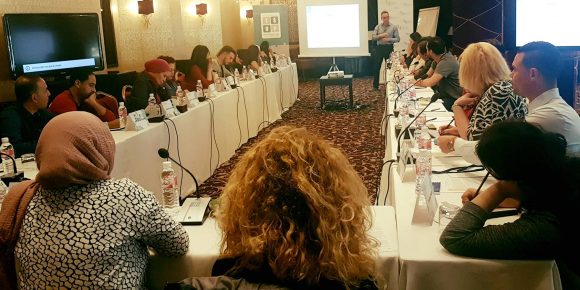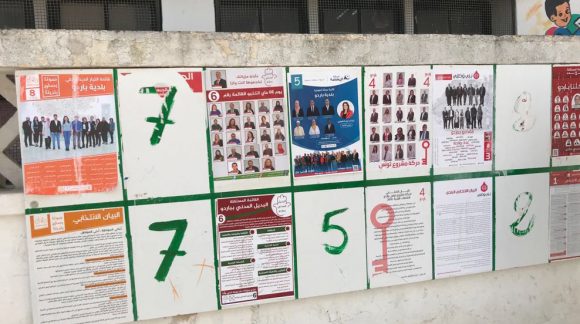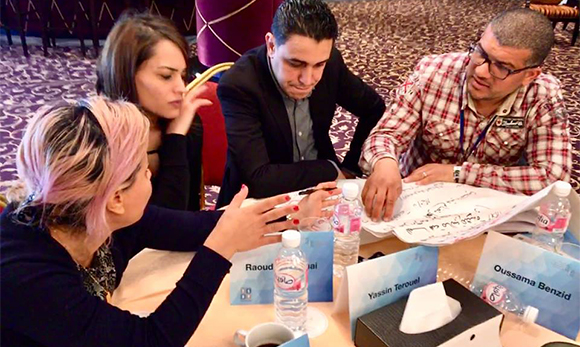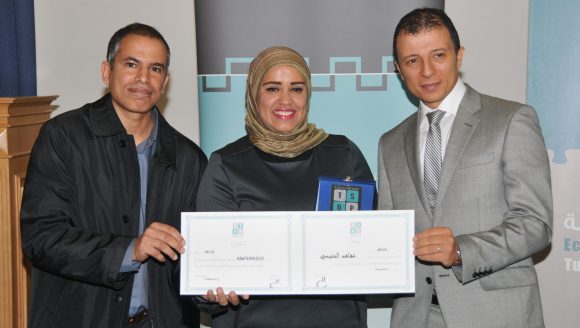Democracy isn’t built in a day: The case of Tunisia

Whenever any country makes its first hopeful steps towards a more democratic government, we are easily inclined to conclude that it has become a democracy.
But real democracy is more than just elections.
It is diversity, accountability and inclusion… It is politicians and political institutions that respond to the needs of the population, and it is a population that calls its politicians to account. And these changes require much more time.
In this series of articles, written by journalist Joris Tielens for the NIMD-Vice Versa Democracy Special, we explore the aftermath of the first steps towards democracy in two very different countries: Tunisia and Colombia.
Part 1: Tunisia
‘It’s not every day that we see a new democracy being born somewhere in the world. I ask that the people of Holland and the international community take a closer look at Tunisia, listen to our experiences and help us to encourage the youth to vote and to participate in our democracy.’
Those are the words of Aymen Cherif, a 25-year-old bank employee in Tunis who is also politically active in Machrouu Tounes, a small new party with four parliamentary seats that they won in the elections held in October this year.
Tunisia holds the distinction of being the sole democracy to emerge from the Arab Spring, the wave of uprisings and revolutions that spread through the Arab world in spring 2011. It all started on 17 December 2010 with the self-immolation of Mohamed Bouazizi, a Tunisian street vendor, in protest against the confiscation of his wares.
Elections in Tunisia
Since that time there have been six elections in Tunisia: municipal, parliamentary and presidential, says Ahmed Driss, director of the Centre des Etudes Méditerranéennes et Internationales (CEMI), a Tunis-based research institute that focuses on democratization.
Parliamentary elections were held last autumn, with a President being elected for the second time. The incumbent President peacefully transferred power to the new one. ‘A full democratic cycle occurred,’ says Driss. ‘When that happens, we can call it an established democracy.’

In the past few years, there have been political crises; young people are being radicalized; and Islamic State has perpetrated attacks in the country. ‘But a national dialogue has been constructed and it has been used to avert crises.’ Elections are fair and peaceful, and everybody is happy with that.
‘After almost a decade of democratic transition, the concept of democracy has become anchored in the nation,’ says Driss. He considers the turnout figures for the elections – around 60% – to be proof of this. ‘A majority of people believe they can make a difference by voting.’
Dissatisfaction with economic progress
But Tunisia has not made it yet, Driss believes and, to him, the problem is not the functioning of the democracy itself. ‘People are angry that this democratic process has not yet led to their expectations of economic advancement and wellbeing.’ For many years, large parts of the country were omitted from economic policy.
Moreover, phosphate mining, which is the country’s biggest source of income, came to a standstill during the revolution. ‘Democracy must deliver – the people are frustrated that the democratic institutions, such as the Parliament and local Government, have not led to improved policy in a way that can really mean something to them.’
Dissatisfaction with corruption and the poor economy saw Tunisians voting for new parties and new faces in the last elections. The political landscape has fragmented and the elected president, Kaïs Saïed, is a partyless outsider.
Independent candidates were also elected to Parliament. ‘I do not believe that is a good thing,’ says Driss. ‘We need political parties in order to create a true democracy. They mean that politicians respond to the needs of the people.’
Democracy requires strong institutions
The creation of parties and institutions, such as municipal councils, city governments, ministries and the Parliament, requires people who understand how democracy functions and have the skills to make a difference to that democracy. Driss is working to achieve that through CEMI, which is funded by NIMD, and which runs the Tunisian School of Politics.
The Tunisian School of Politics
Over the last nine years, over 400 people have been trained at the school, including parliamentarians, local administrators and government ministers. They were taught how the political system works, and what the values of democracy and the role of political parties are. They also learned how to communicate, negotiate and consult through peaceful dialogue.
The subjects range from reading a budget and compiling an amendment or motion, through to disseminating new understandings within the attendees’ own parties.

‘Our alumni are doing well,’ Driss observes. ‘Once they have graduated many of them become candidates in elections or they become a part of government.’
That was the case for Afef Khnissi who, after graduating from the School of Politics, became one of the few women to appear on the parliamentary list of candidates. Her party is a minor opposition party and Khnissi did not get elected to parliament.
Yet she is not dissatisfied with the elections. ‘The youth voted out the old corrupt regime,’ she says. ‘I believe that the jumble of political parties that is now present in Parliament is a transitional phase.’
She works on getting women to participate in politics. ‘Thanks to my training at the School of Politics, I became a trainer in my own party. The school is a breeding ground for young Tunisian talent in the political realm.’
A hard revolution
Khnissi has been free to express her opinions since the revolution. ‘But the revolution did not smell of roses. It was about freedom of expression, the youth participating in politics, and dignity and equality – and those things have become ever more important over the years. Today, diversity is valued.’

Aymen Cherif, who is also a School of Politics graduate, agrees that the term “Jasmine Revolution” is misleading. ‘It’s great that today we are able to make more choices freely,’ he says, ‘but it was not a beautiful revolution during which we handed out jasmine flowers.
‘It was a bad time for Tunisians; people were beaten on the streets, and many died defending their country, their freedom and their dignity.’
Now it’s time for the economy to pick up, Cherif opines. His hopes are resting on the outside world, on investment and on aid to train the youth. ‘That would help to reduce unemployment and create jobs.’
Towards an inclusive system
Cherif believes that the lack of economic prospects is why people have no faith in democracy. Driss agrees, saying that everybody should be able to participate. ‘We’re not working with everyone, only with politicians and aspiring politicians. But if we can help them to do their jobs properly, they bring others aboard in the political process.’
This could prevent the radicalization of Islamic youths, says Driss. ‘The youth must feel as if they are part of society. That’s at the very core of democratization.’
While the weak economy has made Tunisian democracy vulnerable, he remains optimistic. ‘Compared to other countries that were a part of the Arab Spring, we have a small and a relatively homogenous and well-educated population. There is no majority that wants to oppress a minority.’
On Monday 10 February, NIMD is partnering up with Vice Versa to host “Talkshow: Een Inclusieve Democratie” in The Hague. The talkshow will bring experts from the forefront of the democratization movement together, featuring current and former politicians and experts from civil society.
